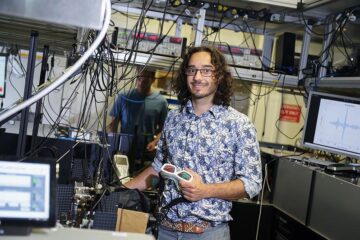Jan-Michael Peters receives Wittgenstein Award 2011

To pass the genome from one generation to the next, cells of higher organisms first duplicate their DNA, then biorient chromosomes on the mitotic spindle and finally separate their sister chromatids, enabling division of one cell into two genetically identical daughter cells.
Although cell division (mitosis) has been studied for more than a century, the molecular understanding of this complicated process is far from complete. It is, however, a process of vital importance to any living being. If the timing is slightly wrong, the chromosomes may not be distributed correctly, which in turn may lead to the formation of tumours or birth defects.
The research efforts of Jan-Michael Peters are aiming at understanding cell division at the molecular level. In recent years, he was able to identify and characterise several proteins involved in regulating mitosis. A number of these proteins are organised into larger complexes working much like molecular machines. To know the exact structure and function of these machines will help understanding how certain diseases develop and how they might be treated.
“I am really thrilled about this award”, says Jan-Michael Peters. “Even though we do understand to some degree how chromosomes are passed on during cell division, we know little about how DNA is packaged within these chromosomes. The generous endowment that comes with the award will enable us to tackle this question so fundamental to molecular biology and genome research.”
The Wittgenstein Award is Austria's largest and most prestigious research prize. It has been awarded by the FWF on behalf of the Austrian Ministry of Science and Research since 1996. Jan-Michael Peters is the fifth IMP researcher to win the award, following Erwin Wagner (1996), Kim Nasmyth (1999), Meinrad Busslinger (2001) and Barry Dickson (2005, then Senior Scientist at IMBA).
About Jan-Michael Peters
Jan-Michael Peters was born in Germany in 1962. He studied Biology in Kiel and Heidelberg and in 1991 obtained his PhD in Cell Biology. As a postdoctoral fellow, Peters worked with Werner Franke at the German Cancer Research Center in Heidelberg and later in Marc Kirschner’s lab at the Harvard Medical School in Boston. In 1996, Jan-Michael Peters moved to Vienna to become a Group Leader at the IMP. In 2002, he was promoted to Senior Scientist and in 2011 became the IMP’s Scientific Deputy Director.
Jan-Michael Peters has received a number of awards for his research on cell division, including the EMBO Young Investigator Award and the Novartis Research Prize. He is a member of the European Molecular Biology Organisation EMBO. As coordinator of two EU Integrated Projects, MitoCheck and MitoSys, Peters is leading interdisciplinary and international research efforts in the area of cell division.
About the IMP
The Research Institute of Molecular Pathology (IMP) in Vienna is a basic biomedical research institute largely sponsored by Boehringer Ingelheim. With over 200 scientists from 30 nations, the IMP is committed to scientific discovery of fundamental molecular and cellular mechanisms underlying complex biological phenomena. Research areas include cell and molecular biology, neurobiology, disease mechanisms and computational biology. The IMP is a founding member of the Campus Vienna Biocenter.
Contact
Dr. Heidemarie Hurtl
IMP-IMBA Communications
Tel.: (+43 1) 79730 3625
Mobile: +43 (0)664/8247910
hurtl@imp.ac.at
Scientific contact
Jan-Michael.Peters@imp.ac.at
Media Contact
Weitere Informationen:
http://www.imp.ac.atAlle Nachrichten aus der Kategorie: Förderungen Preise
Neueste Beiträge

Neue universelle lichtbasierte Technik zur Kontrolle der Talpolarisation
Ein internationales Forscherteam berichtet in Nature über eine neue Methode, mit der zum ersten Mal die Talpolarisation in zentrosymmetrischen Bulk-Materialien auf eine nicht materialspezifische Weise erreicht wird. Diese „universelle Technik“…

Tumorzellen hebeln das Immunsystem früh aus
Neu entdeckter Mechanismus könnte Krebs-Immuntherapien deutlich verbessern. Tumore verhindern aktiv, dass sich Immunantworten durch sogenannte zytotoxische T-Zellen bilden, die den Krebs bekämpfen könnten. Wie das genau geschieht, beschreiben jetzt erstmals…

Immunzellen in den Startlöchern: „Allzeit bereit“ ist harte Arbeit
Wenn Krankheitserreger in den Körper eindringen, muss das Immunsystem sofort reagieren und eine Infektion verhindern oder eindämmen. Doch wie halten sich unsere Abwehrzellen bereit, wenn kein Angreifer in Sicht ist?…





















